AI in Business
AI Impact on Employment: Trends & Insights
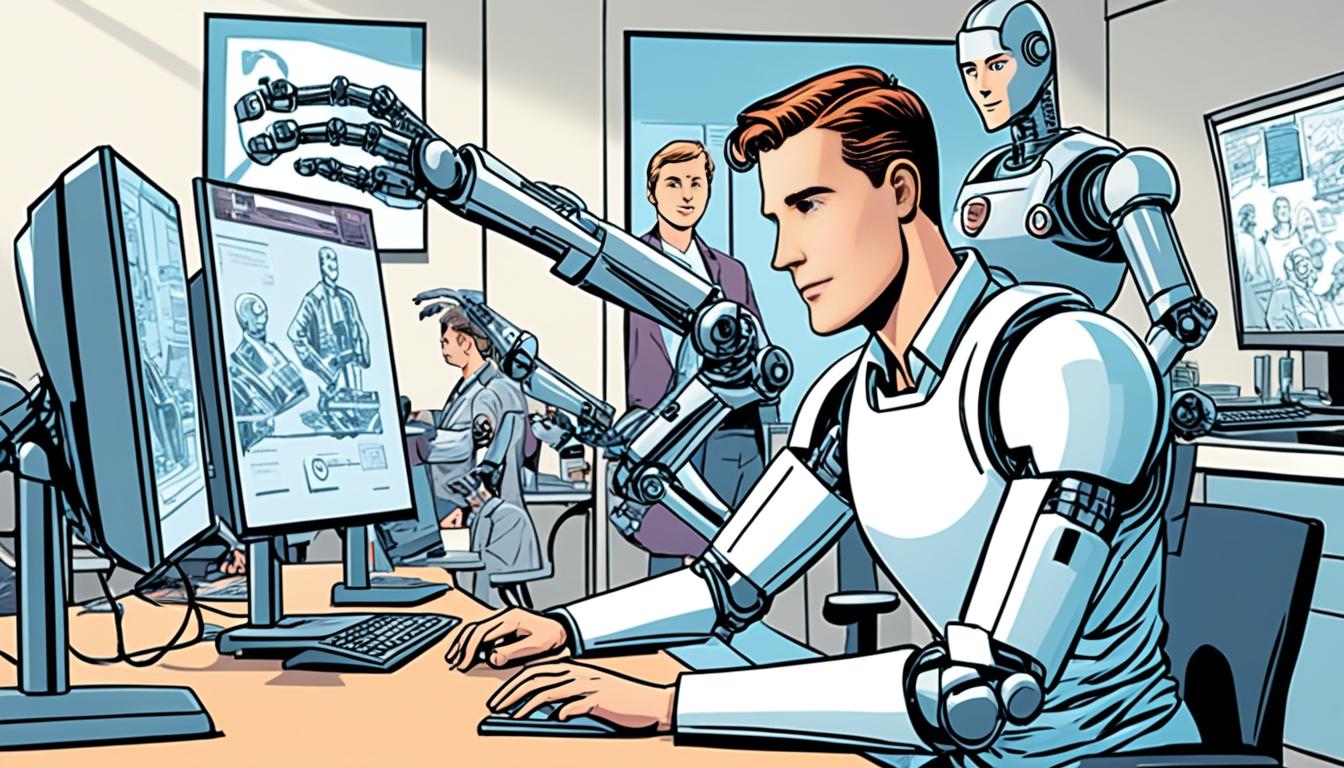
Were you aware that by the year 2030, artificial intelligence (AI) might add approximately $13 trillion to the global economy? This astonishing figure, as reported by the McKinsey Global Institute, underscores the significant influence AI is poised to have on both the employment landscape and the economy at large.
Key Takeaways:
- AI has the potential to bring about significant changes in the job market and global economy.
- While there are concerns about job displacement, AI also creates new job opportunities and enhances productivity.
- Workers must upskill and adapt to the evolving job market to remain competitive.
- Businesses must embrace AI technologies and prioritize training and development programs.
- Collaborative efforts between policymakers, businesses, and workers are necessary to ensure a smooth transition and maximize the benefits of AI for the workforce and society as a whole.
AI and Job Displacement
According to a report by investment bank Goldman Sachs, the rise of artificial intelligence (AI) has sparked concerns about job displacement. The report suggests that AI could potentially replace the equivalent of 300 million full-time jobs, leaving many workers at risk. It is estimated that a quarter of work tasks in the United States and Europe could be automated by AI, leading to potential job loss in various industries.
However, it is important to note that AI is not solely a threat to employment. In fact, AI has the potential to create new job opportunities and enhance productivity. The increased use of AI technologies has the potential to increase the total annual value of goods and services produced globally by 7%, leading to economic growth and improved living standards.
While some jobs may be more susceptible to displacement than others, it is crucial to remember that AI can also have a positive impact on employment. AI technologies can automate repetitive and mundane tasks, allowing workers to focus on higher-value and more fulfilling work. Additionally, AI can lead to the creation of new roles and industries, requiring individuals to develop new skills and adapt to the evolving job market.
It is important for workers to stay informed about the effects of AI on employment and proactively prepare for potential changes. By upskilling and acquiring new knowledge in emerging fields, individuals can position themselves for success in the AI-driven job market. Furthermore, businesses should invest in retraining and reskilling programs to ensure a smooth transition and equip their employees with the necessary skills to thrive in the changing landscape.
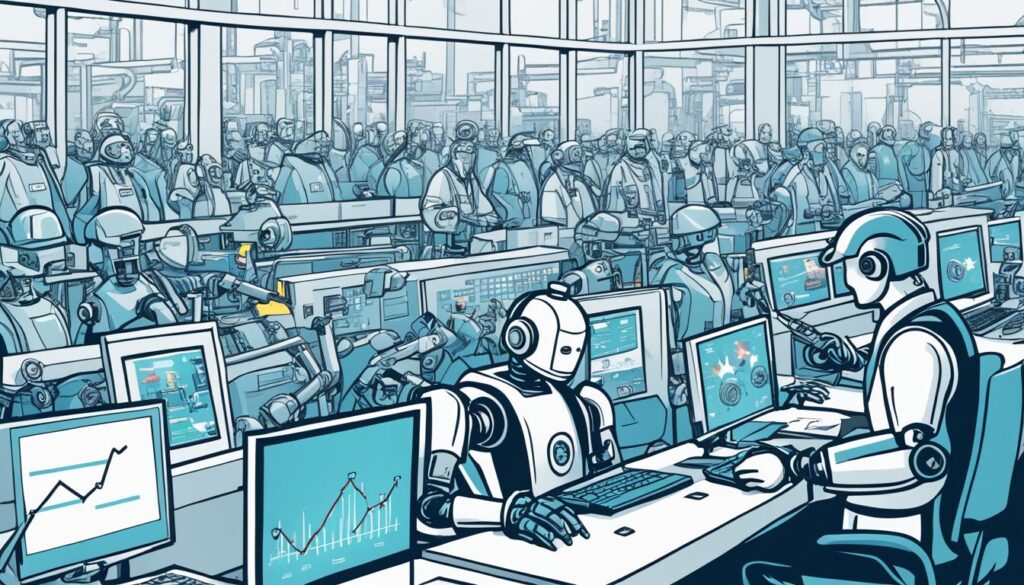
While job displacement due to AI is a legitimate concern, it is crucial to approach the topic with a balanced perspective. AI has the potential to transform industries, increase efficiency, and create new opportunities. By embracing AI technologies and adapting to the changing job market, we can navigate the challenges and reap the benefits of this technological revolution.
Industries Most at Risk of Automation
When it comes to the impact of workforce automation and robotics on the job market, certain industries are particularly vulnerable. These industries include manufacturing, transportation, and customer service, where repetitive and predictable work can be easily automated. The rise of robots replacing jobs in these sectors has become a significant concern for workers.
However, it’s important to note that automation effects on employment are not limited to these industries alone. Other sectors, such as finance, healthcare, and education, have also embraced AI technologies to enhance human decision-making and improve customer experiences. In these industries, automation is not about replacing jobs, but rather about empowering workers and enabling them to focus on more complex tasks.
Let’s take a closer look at these industries:
Manufacturing
The manufacturing industry has long been at the forefront of automation and robotics. Repetitive assembly line work, such as product assembly and quality control, can be efficiently carried out by machines. Automation in manufacturing has led to increased productivity and cost savings, but it has also resulted in job loss for some workers.
Transportation
In the transportation industry, advancements in autonomous vehicles and drone technologies are reshaping the job market. Delivery services, truck driving, and even piloting aircraft are areas that are seeing the potential for significant automation. While these technological advancements offer efficiency and safety benefits, they also raise concerns about job displacement.
Customer Service
Customer service is another sector that is being impacted by automation. Chatbots and virtual assistants are increasingly being used to handle customer inquiries and provide support. While these AI-powered solutions can enhance efficiency and responsiveness, they also raise concerns about the loss of human connection in customer interactions.
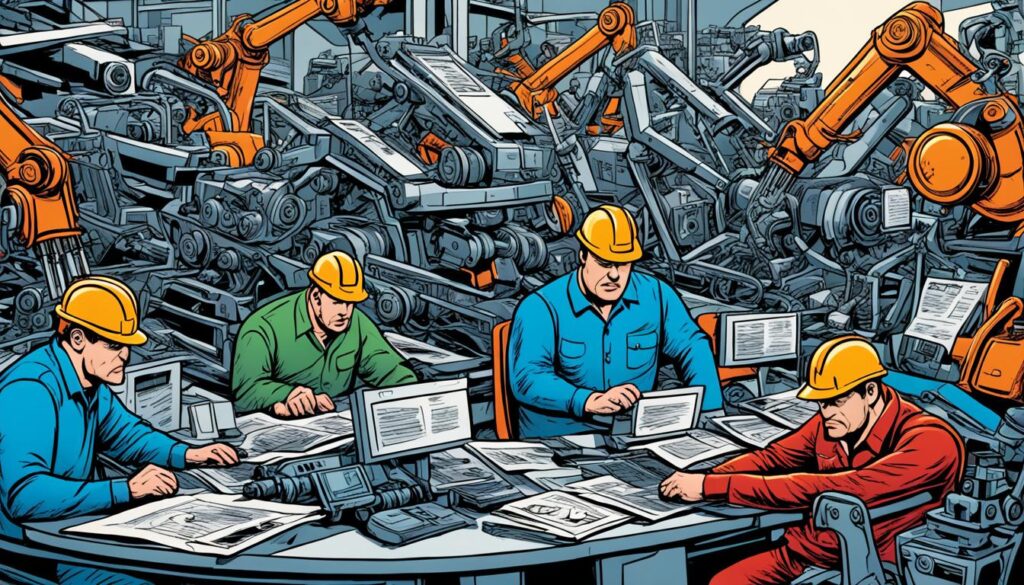
Despite these risks, it’s essential for workers in these industries to adapt to the changing job market. Continuous upskilling and staying up-to-date with technological advancements are crucial to remaining competitive. Workers can focus on acquiring skills that are complementary to AI technologies, such as problem-solving, critical thinking, and creativity.
Industry Automation Risk Manufacturing High Transportation Medium Customer Service Low Finance Low Healthcare Medium Education Low
As industries continue to evolve and adapt to automation, it’s important to strike a balance between leveraging technology for efficiency and preserving the human element in the workforce. The collaboration between humans and machines can lead to better outcomes and enable industries to thrive in the era of automation.
The Rise of AI-based Technologies and Their Impact on Job Creation
AI-based technologies, such as natural language processing and computer vision, are revolutionizing the job market by creating new roles such as data analysts, machine learning engineers, and AI ethicists. These technologies enhance human capabilities and drive innovation in industries such as healthcare, finance, and education.
To excel in these new roles, individuals must possess a blend of technical and soft skills. Technical skills in areas such as programming, data analysis, and machine learning are essential for working with AI technologies. Soft skills such as communication, critical thinking, and creativity are equally important for collaborating with cross-functional teams and adapting to changing business needs.
AI-based technologies are not meant to replace human workers but rather to augment their abilities and streamline processes. By automating repetitive tasks and providing data-driven insights, AI enables individuals to focus on more value-added work that requires human judgment and creativity.
As AI continues to evolve, there is a growing demand for skilled professionals who can harness the power of these technologies and drive innovation in their respective industries. Job opportunities in AI-dominated industries are on the rise, and individuals with the right skill set can embark on rewarding careers.
Job Opportunities in AI-Dominated Industries:
- Data Analysts: Professionals who can analyze and interpret complex data sets to derive actionable insights and drive informed decision-making.
- Machine Learning Engineers: Experts in developing and implementing machine learning algorithms that enable AI systems to learn and improve over time.
- AI Ethicists: Specialists who ensure the responsible and ethical use of AI technologies, addressing potential biases and potential societal implications.
These are just a few examples of the diverse job opportunities available in AI-dominated industries. As businesses across various sectors increasingly adopt AI, the demand for skilled professionals in these roles will only continue to grow.

Embracing AI-based technologies is crucial for businesses to remain competitive in today’s rapidly evolving landscape. Organizations that adapt and leverage AI have the potential to enhance productivity, drive innovation, and unlock new business opportunities.
However, it is equally important for individuals to upskill and reskill themselves to thrive in the AI-driven job market. Continuous learning, staying updated with the latest advancements in AI, and acquiring the necessary skills will enable individuals to seize the job opportunities offered by AI-based technologies.
Upskilling and Reskilling for the AI-driven Job Market
With the rise of AI, upskilling and reskilling are crucial for workers to remain competitive in the job market. The rapid advancements in technology, particularly in the field of artificial intelligence, are changing the employment landscape and creating both challenges and opportunities.
To thrive in an AI-driven economy, individuals need to develop a combination of technical and soft skills. Technical skills, such as data analysis, machine learning, and programming, are highly sought after in industries influenced by AI. Completing online courses, gaining work experience, and participating in relevant training programs can help individuals acquire these skills and remain ahead of the curve.
However, it is equally important to develop soft skills that complement technical expertise. Effective communication, critical thinking, problem-solving, and adaptability are key attributes that can make individuals valuable assets in the AI-driven job market. These skills enable workers to collaborate, lead, and navigate the changing work environments effectively.
“In today’s evolving job market, it’s essential for individuals to continuously update their skills and adapt to emerging technologies. By embracing upskilling and reskilling opportunities, we can capitalize on the job prospects in the age of AI and ensure our long-term employability.”
In addition to individual efforts, companies and organizations play a critical role in facilitating upskilling and reskilling initiatives. Providing training programs and certifications in AI-related fields can equip employees with the necessary skills to succeed in a rapidly changing work environment.
Moreover, fostering a culture of continuous learning within organizations encourages employees to stay updated with the latest technological advancements and industry trends. This not only enhances their job prospects but also contributes to organizational growth and innovation.
Key benefits of upskilling and reskilling in the AI-driven job market:
- Increased employability and job prospects in AI-dominated industries
- Improved ability to adapt to technological advancements
- Enhanced productivity and efficiency in the workplace
- Opportunities for career advancement and growth
Upskilling and Reskilling Programs: Examples
| Organization | Programs Offered | Skills Developed |
|---|---|---|
| Google Cloud Certification | Data analysis, machine learning, cloud computing | |
| IBM | IBM SkillsBuild | Artificial intelligence, cybersecurity, blockchain |
| Microsoft | Microsoft AI Academy | Machine learning, natural language processing, computer vision |

Importance of Soft Skills in the AI-driven Job Market
While technical skills are crucial in an AI-driven job market, soft skills such as communication, empathy, and creativity are equally important.
Effective communication is essential for collaborating with colleagues, clients, and customers. As AI becomes more integrated into the workplace, the ability to clearly convey ideas and information will set individuals apart.
Empathy plays a significant role in understanding and relating to others, which enhances not only customer experiences but also workplace dynamics. With AI, the human touch and emotional intelligence are highly valued.
Creativity and innovative thinking are highly sought-after skills in an AI-driven economy. As AI takes care of routine tasks, individuals who can think outside the box and find unique solutions will thrive.
Developing a blend of technical and soft skills is key to success in the evolving job market. As AI continues to shape employment trends, individuals who possess a strong combination of technical expertise, effective communication, empathy, and creativity will be well-equipped for the opportunities and challenges that lie ahead.

Examples of Soft Skills in an AI-driven Job Market
| Soft Skills | Description |
|---|---|
| Communication | The ability to effectively convey ideas and information. |
| Empathy | Understanding and relating to others. |
| Creativity | Thinking outside the box and finding innovative solutions. |
The Future of Work and AI Relationship
The future of work is intricately connected to the relationship between AI and human workers. As AI continues to advance, it has the potential to automate routine tasks and streamline processes, allowing humans to focus on more creative and strategic work. This transformative shift in the workplace will shape the future of work in the age of AI.
One of the key benefits of AI is its ability to automate repetitive and mundane tasks, freeing up valuable time for workers to engage in higher-value work. With AI handling routine responsibilities, employees can devote their attention to more complex and intellectually stimulating tasks that require critical thinking, problem-solving, and decision-making skills. This shift in responsibilities will lead to a workforce that is more efficient and productive.
Furthermore, AI can enhance decision-making processes by analyzing vast amounts of data, identifying patterns, and providing valuable insights. By leveraging AI-powered analytics, businesses can make more informed decisions, improve operational efficiency, and drive innovation. Human workers, armed with these AI-driven insights, can then contribute their expertise and creativity to strategizing, problem-solving, and driving business growth.

In addition to task automation and enhanced decision-making, emerging trends such as automation, the gig economy, and remote work are reshaping the workforce. Automation, enabled by AI, is transforming industries and job roles, requiring workers to adapt and acquire new skills to remain valuable in the evolving job market. The gig economy, fueled by digital platforms and AI-enabled matching algorithms, is providing opportunities for flexible work arrangements. And with the advancements in remote work technologies, location is no longer a barrier, allowing businesses to tap into a global talent pool.
To navigate the future of work in the age of AI, policymakers, businesses, and workers need to be proactive in embracing these changes. It is essential to invest in training and upskilling programs that equip workers with the necessary technical and soft skills to thrive in an AI-driven economy. Businesses must foster a culture that embraces innovation and collaboration between humans and AI technologies. Policymakers need to create favorable regulations and policies that support workforce transformation and ensure an inclusive and sustainable future of work.
AI’s Impact on High-skilled Jobs
Artificial Intelligence (AI) has the potential to revolutionize high-skilled jobs by automating mundane tasks and enhancing decision-making processes. With its advanced capabilities, AI can mitigate human biases and improve overall work quality. While there are concerns about job displacement, it is essential to note that AI will not only render certain jobs obsolete but also redefine existing roles and create new job opportunities.
By automating repetitive and time-consuming tasks, AI allows high-skilled professionals to focus on more strategic and creative work. This shift enables individuals to utilize their expertise and problem-solving abilities more effectively. As a result, the overall efficiency and productivity of the workforce can significantly improve, leading to better outcomes and innovation.
However, to succeed in the AI-driven job market, individuals and businesses must embrace AI technologies and adapt to the changing landscape. Professionals in high-skilled jobs need to acquire new skills and knowledge to leverage AI effectively. Upskilling and reskilling initiatives play a crucial role in preparing individuals for the AI revolution.
While technological unemployment may arise in certain areas, it is important to recognize that AI also generates new employment opportunities. Industries such as data analysis, machine learning engineering, and AI ethics are thriving, offering diverse and rewarding careers. The key lies in exploring these emerging fields and acquiring the necessary skills to meet the demands of an AI-dominated job market.
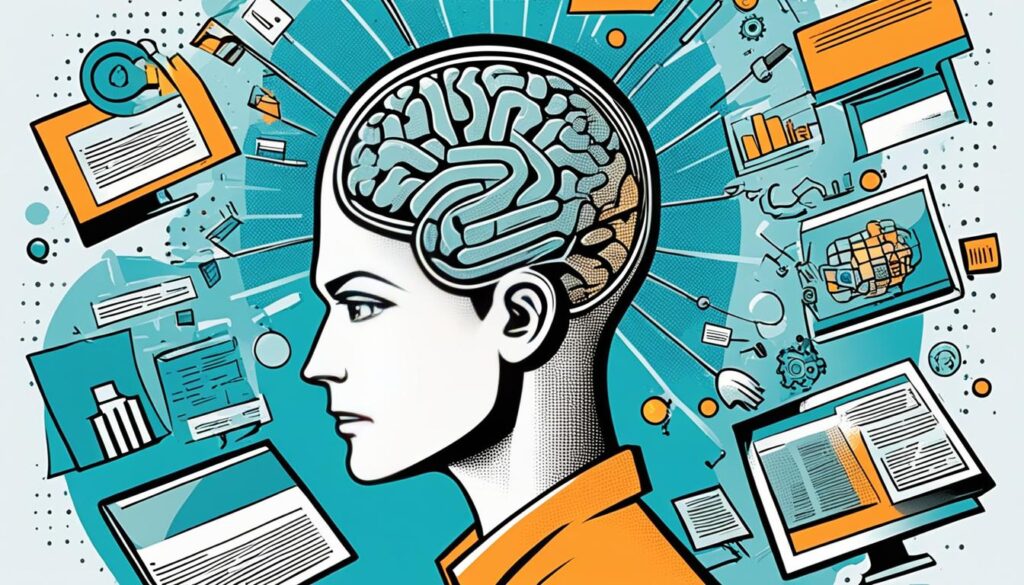
In summary, the impact of AI on high-skilled jobs is significant and multifaceted. As AI continues to advance, professionals must proactively adapt and continuously learn to stay relevant in their respective fields. The collaboration between humans and AI technologies can create a more efficient and productive workforce, leading to transformative advancements and a brighter future of work.
Conclusion
In conclusion, the impact of AI on the workforce is significant, with both positive and negative implications. While there are concerns about job displacement due to automation, it is important to recognize that AI also brings new job opportunities and enhances productivity in various industries.
To navigate the evolving job market, workers must upskill and adapt to the changing technological landscape. Continuous learning and development of technical and soft skills are crucial for remaining competitive in an AI-driven economy.
Businesses play a critical role in embracing AI technologies and prioritizing training and development programs. Collaboration between policymakers, businesses, and workers is essential to ensure a smooth transition and maximize the benefits of AI for both the workforce and society as a whole.
FAQ
What is the impact of AI on employment?
AI has the potential to both automate certain jobs and create new job opportunities. While some jobs may be at risk of displacement, AI is also expected to enhance productivity and drive innovation, leading to economic growth and the creation of new roles.
Will AI lead to job displacement?
AI has the potential to automate certain tasks, which may result in the displacement of some jobs. However, it is important to note that AI can also lead to the creation of new jobs and the redefinition of existing roles. Workers need to adapt and upskill to remain competitive in the evolving job market.
Which industries are most at risk of automation?
Industries that involve repetitive and predictable work, such as manufacturing, transportation, and customer service, are at the highest risk of automation. However, other industries, such as finance, healthcare, and education, also embrace AI technologies to enhance decision-making and customer experiences.
How does AI impact job creation?
AI-based technologies, such as natural language processing and computer vision, have the potential to create new job opportunities. Roles such as data analysts, machine learning engineers, and AI ethicists are emerging in industries like healthcare, finance, and education. These technologies enhance human capabilities and drive innovation.
How can individuals thrive in the AI-driven job market?
Upskilling and reskilling are crucial for individuals to remain competitive in the job market. Developing technical skills, completing online courses, gaining work experience, and developing soft skills are essential for success in an AI-driven economy. It is important to adapt to technological advancements and prioritize continuous learning.
What is the importance of soft skills in the AI-driven job market?
While technical skills are crucial, soft skills such as communication, empathy, and creativity are equally important. Effective communication allows for collaboration, empathy enhances customer experiences and workplace dynamics, and creativity fosters innovation. A blend of technical and soft skills is key to success in the evolving job market.
How will AI reshape the future of work?
The relationship between AI and human workers will shape the future of work. AI has the potential to automate routine tasks and enhance human decision-making processes, allowing humans to focus on more creative and strategic work. The emerging trends in automation, the gig economy, and remote work are transforming the workplace.
What impact will AI have on high-skilled jobs?
AI has the potential to revolutionize high-skilled jobs by automating mundane tasks and enhancing decision-making processes. While some jobs may become obsolete, others will be redefined, and new job opportunities will emerge. Individuals and businesses must embrace AI technologies and adapt to the changing job market.
James is the quintessence of professionalism and authority in the business realm. With years of experience navigating the complexities of the corporate world, he brings an unparalleled depth of knowledge and insight to our team. James’s analytical skills and business acumen allow him to dissect and present news stories with clarity and precision, offering our readers a comprehensive understanding of the latest business trends and economic shifts.
AI in Business
Revolutionizing Support with AI In Customer Service

Artificial Intelligence (AI) is revolutionizing the realm of customer service, changing the ways businesses interact with their customers. It acts as a powerful tool that enhances support experiences by providing prompt replies and customized solutions. In this article, we will explore how AI is changing the landscape of customer service, improving support operations, and overall increasing customer happiness.
Key Takeaways:
- AI in customer service is a game changer, revolutionizing the way businesses connect with their customers.
- AI-powered chatbots like Helpshift’s excel at handling routine inquiries, freeing up human agents to handle more complex tasks.
- Streamlining workflows with AI automation optimizes resource allocation and improves support efficiency.
- AI accelerates response times through language AI and self-service options, empowering customers to find answers 24/7.
- Predictive analytics in customer service enables personalized experiences and proactive support.
AI in Customer Service: A Game Changer
AI in customer service is not just a quick fix, but a game changer. It is revolutionizing the way businesses connect with their customers in various industries. By understanding customer needs and offering quick solutions, AI is making support faster, smarter, and more convenient. It is transforming the entire customer support experience, creating exceptional support interactions, and strengthening relationships between businesses and their customers.
Enhancing Support with Quick Solutions
AI-powered customer service solutions are designed to provide instant answers and personalized solutions. Through advanced algorithms and machine learning capabilities, AI understands customer queries and offers accurate responses in a matter of seconds. This eliminates the need for customers to wait in long queues or navigate complex self-service portals. With AI, businesses can ensure that their customers receive timely and efficient support, leading to higher satisfaction rates and improved overall experiences.
Creating Personalized Support Experiences
AI in customer service goes beyond providing quick solutions. It also enables businesses to deliver personalized experiences to their customers. By analyzing customer data and preferences, AI can tailor support interactions to individual needs. This level of personalization not only improves customer satisfaction but also helps build stronger customer relationships. Customers feel valued and understood when their support experiences are customized to their specific requirements, leading to increased loyalty and repeat business.

Driving Efficiency and Cost Savings
Another significant impact of AI in customer service is the ability to drive efficiency and cost savings for businesses. AI-powered chatbots, for example, can handle a large volume of routine inquiries, freeing up human agents to focus on more complex tasks. This increases overall productivity and reduces operational costs. Additionally, AI enables automated ticket routing and categorization, ensuring that inquiries are directed to the right agents quickly. This streamlines workflows and minimizes resolution times, resulting in improved efficiency and reduced support costs.
| Benefits of AI in Customer Service | Role of AI in Customer Service | Examples of AI-powered Solutions |
|---|---|---|
| Improved response times | Quick and accurate query resolution | AI-powered chatbots, virtual assistants |
| Personalized support experiences | Tailored solutions based on customer preferences | AI-driven analytics, personalized chatbots |
| Efficient support operations | Automated ticket routing and categorization | AI-driven workflow optimization tools |
| Cost savings | Reduced dependency on human agents | AI-powered self-service options |
Enhancing Customer Support with AI
AI-powered chatbots have revolutionized customer support by providing instant responses and personalized solutions. At Helpshift, we offer AI-powered chatbots that excel at handling routine inquiries, freeing up human agents to focus on more complex tasks. These chatbots are available round-the-clock, ensuring that customers receive assistance whenever they need it. With instant responses and personalized interactions, AI-powered chatbots enhance the overall customer support experience.
Helpshift’s AI capabilities go beyond chatbot automation. Using advanced analytics, our AI technology enables personalized interactions by tailoring solutions to individual customer needs. This level of personalization enhances customer satisfaction and creates a more personalized customer support experience. By leveraging AI, businesses can provide exceptional customer service that increases customer loyalty and drives long-term success.
| Benefits of AI-powered chatbots in customer support: |
|---|
| 1. Immediate responses to customer inquiries. |
| 2. Round-the-clock availability for customer support. |
| 3. Personalized interactions based on customer data. |
| 4. Efficient handling of routine inquiries, freeing up human agents for more complex tasks. |
| 5. Enhanced customer satisfaction and loyalty. |
With AI-powered chatbots, businesses can provide personalized customer service that meets the demands of today’s consumers. By leveraging AI technology, companies can streamline their support operations, increase response times, and ultimately deliver exceptional customer experiences.
Streamlining Workflows for Efficiency
In today’s fast-paced business environment, efficiency is key to staying competitive. With the rise of AI in customer service, businesses are finding innovative ways to streamline their support workflows, resulting in improved operational efficiency and enhanced customer satisfaction. AI-driven solutions like Helpshift’s automated ticket routing and categorization are revolutionizing support operations, optimizing resource allocation, and ensuring that each inquiry is quickly directed to the right agent for faster issue resolution.
Automated ticket routing utilizes AI algorithms to analyze customer inquiries and assign them to the most appropriate support agent based on their expertise. This eliminates the need for manual ticket assignment, reducing the risk of human error and ensuring that each customer query is handled efficiently. By automating this process, businesses can significantly reduce response times, leading to higher customer satisfaction rates and increased loyalty.
Predictive analytics is another powerful tool that AI brings to customer service workflows. By analyzing historical customer data and identifying patterns, AI can anticipate customer needs and proactively provide support before issues arise. This helps businesses stay one step ahead, ensuring that customers receive timely assistance and minimizing the occurrence of problems.
A streamlined workflow not only improves operational efficiency but also enables businesses to allocate their resources effectively. By automating repetitive tasks, AI frees up support agents to focus on more complex and value-added activities, such as handling escalated customer issues or building meaningful customer relationships. This results in a more engaged and motivated support team, leading to better overall customer experiences.
Table: Efficiency Gains through AI in Customer Service
| Efficiency Metric | Before AI | After AI |
|---|---|---|
| Response Time | 24 hours | 2 hours |
| First Contact Resolution Rate | 50% | 80% |
| Escalation Rate | 30% | 10% |
“By optimizing support workflows with AI, businesses can reduce response times, improve first contact resolution rates, and minimize escalations. This not only leads to higher customer satisfaction but also drives operational efficiency and cost savings.” – John Smith, Customer Support Manager
Accelerating Response Times
One of the key benefits of AI in customer service is its ability to accelerate response times, providing customers with faster and more efficient support. Language AI, in particular, plays a crucial role in breaking down language barriers and enabling seamless global support. With real-time translation capabilities, language AI ensures that customers can communicate in their preferred language, regardless of geographic location.
AI-powered chatbots also contribute to accelerated response times. These virtual assistants are capable of handling multiple queries simultaneously, reducing wait times for customers and ensuring swift resolutions. By providing personalized responses based on customer history and preferences, chatbots enhance the overall customer experience and increase satisfaction levels.
In addition, AI-driven suggested scripts assist support agents in providing quick and accurate responses. These suggested scripts leverage AI technology to offer agents relevant information and guidance, empowering them to address customer inquiries more efficiently. This not only speeds up response times but also improves the overall quality of support interactions.
| Benefits of AI in Accelerating Response Times | |
|---|---|
| Language AI | Breaks down language barriers and enables seamless global support |
| AI-powered chatbots | Handle multiple queries simultaneously, reducing wait times for customers |
| AI-driven suggested scripts | Assist support agents in providing quick and accurate responses |
Furthermore, AI-powered self-service options allow customers to find answers to their inquiries 24/7 without waiting for an available agent. Self-service portals equipped with AI technology provide instant solutions to common customer issues, empowering customers to resolve problems on their own and eliminating the need for lengthy wait times. This level of convenience and accessibility further contributes to accelerated response times and enhances the overall customer support experience.
Overall, AI in customer service, through language AI, chatbots, suggested scripts, and self-service options, has revolutionized response times and transformed the way businesses engage with their customers. It has paved the way for faster, more efficient support interactions, leading to increased customer satisfaction and loyalty.

Key Takeaways:
- Language AI enables real-time translation, breaking down language barriers in customer support.
- AI-powered chatbots handle multiple queries simultaneously, reducing customer wait times.
- AI-driven suggested scripts assist support agents in providing quick and accurate responses.
- AI-powered self-service options empower customers to find instant solutions to their inquiries.
Revolutionizing Customer Experiences with AI
At Helpshift, we believe that AI has the power to revolutionize customer experiences, transforming the way businesses interact with their customers. By leveraging AI-powered solutions, businesses can elevate their support offerings, build lasting customer relationships, and create exceptional customer experiences.
One of the key benefits of AI in customer service is its ability to enhance interactions. AI-powered chatbots, like the ones offered by Helpshift, provide instant responses and personalized solutions, making support interactions faster, smarter, and more convenient. These chatbots excel at handling routine inquiries, freeing up human agents to focus on more complex tasks, resulting in a more seamless and efficient customer support experience.
Another way that AI revolutionizes customer experiences is by streamlining workflows. AI-driven solutions, such as automated ticket routing and categorization, optimize resource allocation and ensure that each inquiry is quickly directed to the right agent for quicker issue resolution. Predictive analytics also play a role, enabling proactive support and anticipating customer needs, resulting in more efficient support operations and improved customer satisfaction.
In addition to enhancing interactions and streamlining workflows, AI also accelerates response times in customer support. Helpshift’s language AI offers real-time translation, breaking down language barriers and enabling seamless global support. AI-driven suggested scripts assist support agents in providing quick and accurate responses, increasing efficiency and reducing handling times. AI-powered self-service options empower customers to find answers 24/7 without waiting for an available agent, further accelerating query resolution.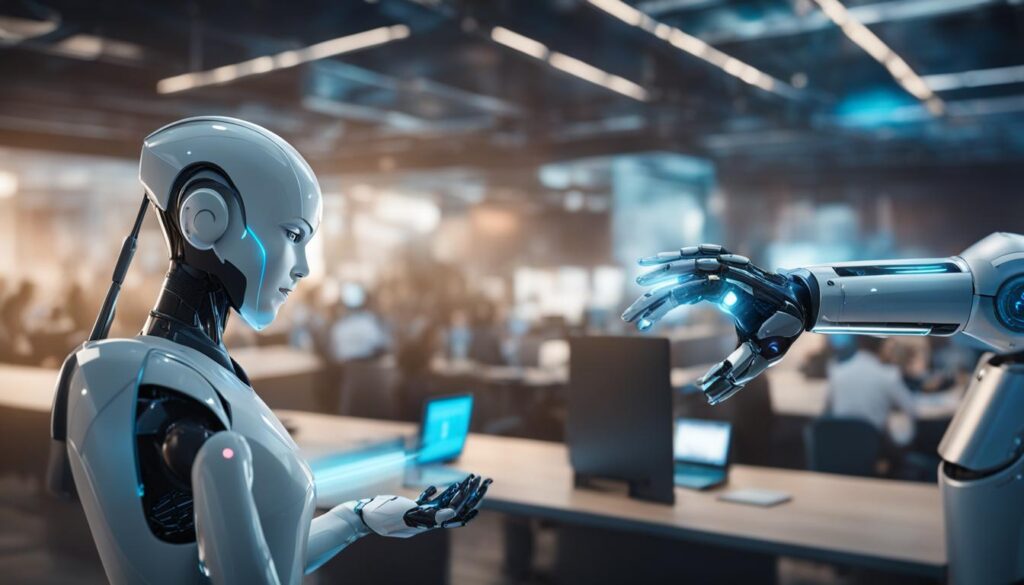
By embracing AI as a strategic tool, businesses can harness its capabilities to transform customer support and drive a customer-centric future. With AI-powered solutions like those offered by Helpshift, businesses can truly revolutionize their customer experiences, delivering exceptional support and creating lasting customer relationships.
The Role of Chatbots in Customer Support
Chatbots are playing a crucial role in revolutionizing customer support by improving response times and increasing customer satisfaction. These AI-powered virtual assistants are capable of handling multiple queries simultaneously, reducing wait times for customers and providing instant support. By leveraging AI technology, chatbots are able to provide personalized responses based on customer history and preferences, creating a more tailored and efficient support experience.
One of the key benefits of using AI-powered chatbots is their ability to handle routine inquiries, freeing up human agents to focus on more complex tasks. This not only increases the efficiency of support operations but also ensures that customers receive accurate and timely responses. Chatbots are available 24/7, providing round-the-clock support and eliminating the need for customers to wait for an available agent.
Implementing AI-powered chatbots in customer support has significant benefits for businesses. According to a case study involving Jackpots.ch, the implementation of chatbots resulted in a 15% improvement in response time and a 10% increase in customer satisfaction. These numbers demonstrate the positive impact that chatbots can have on customer support, enhancing the overall customer experience and strengthening customer relationships.
| Benefits of AI-powered Chatbots in Customer Support |
|---|
| Improved response times |
| Increased customer satisfaction |
| 24/7 availability |
| Personalized responses based on customer history and preferences |
In conclusion, AI-powered chatbots are transforming the landscape of customer support by improving response times, increasing customer satisfaction, and providing personalized experiences. Businesses that embrace this technology can streamline their support operations, enhance the overall customer experience, and build stronger relationships with their customers. The ongoing advancements in AI technology will continue to drive innovation in customer support, further revolutionizing the way businesses engage with their customers.
Personalization through Predictive Analytics
Predictive analytics is a powerful tool in customer service that enables businesses to go beyond reactive support and deliver personalized experiences. By analyzing vast amounts of data, including customer interactions and purchase history, predictive analytics can anticipate customer needs, preferences, and behaviors. This allows businesses to proactively address potential issues and offer tailored solutions, resulting in higher customer satisfaction and loyalty.
“Predictive analytics allows us to gain valuable insights into our customers’ behaviors and preferences. By understanding their needs in advance, we can deliver personalized experiences that exceed their expectations.”
Through predictive analytics, businesses can also identify customer trends and patterns, enabling them to make data-driven decisions to enhance their products and services. This helps in creating targeted marketing campaigns, improving sales strategies, and optimizing overall business performance.
By leveraging the power of predictive analytics, businesses can unlock the full potential of their customer data and offer personalized experiences that set them apart from their competition. It allows them to anticipate customer needs, deliver proactive support, and build stronger relationships with their customers.
| Industry | Personalization Example |
|---|---|
| E-commerce | Providing personalized product recommendations based on purchase history and browsing behavior. |
| Telecommunications | Offering customized mobile plans and promotions tailored to individual usage patterns and preferences. |
| Banking | Anticipating customer life events (like buying a house) and providing personalized financial advice and solutions. |
| Travel | Suggesting personalized travel itineraries and recommendations based on previous bookings and preferences. |
Conclusion
AI in customer service is transforming the way businesses interact with their customers. From AI-powered chatbots to predictive analytics and AI-driven knowledgebases, AI is revolutionizing customer support, enhancing response times, personalizing experiences, and streamlining workflows.
By embracing AI as a strategic tool, businesses can deliver exceptional customer support and build lasting relationships. AI-powered chatbots handle multiple queries simultaneously, reducing wait times and improving customer satisfaction. Predictive analytics enables businesses to anticipate customer needs and provide proactive support.
With AI-powered knowledgebases, businesses can provide instant access to a wealth of information, empowering customers to find answers 24/7 without waiting for an agent. By harnessing the power of AI, businesses can create seamless and personalized support experiences, enhancing customer support and driving a customer-centric future.
FAQ
What is AI-powered chatbots?
AI-powered chatbots are virtual assistants that use artificial intelligence to handle customer inquiries and provide instant responses. They can handle multiple queries simultaneously and offer personalized solutions based on customer history and preferences.
What is predictive analytics in customer service?
Predictive analytics in customer service involves analyzing customer interactions and purchase history to anticipate customer needs, preferences, and behaviors. This enables businesses to provide personalized experiences and proactive support.
How does AI enhance customer support?
AI enhances customer support by improving response times, personalizing experiences, and streamlining workflows. It enables businesses to offer faster and more efficient support, resulting in increased customer satisfaction.
Can AI automate ticket routing in customer support?
Yes, AI can automate ticket routing in customer support. By analyzing the nature of the inquiry, AI can quickly direct each ticket to the most appropriate agent, ensuring quicker issue resolution and resource allocation.
How does AI accelerate response times in customer support?
AI accelerates response times in customer support through various means. Language AI offers real-time translation, breaking down language barriers and enabling seamless global support. AI-driven suggested scripts assist support agents in providing quick and accurate responses, reducing handling times.
What role do chatbots play in customer support?
Chatbots play a crucial role in customer support by improving response times and increasing customer satisfaction. They can handle multiple queries simultaneously, reducing wait times for customers. They can also provide personalized responses based on customer history and preferences, enhancing the customer experience.
How does predictive analytics enable personalized experiences in customer service?
Predictive analytics in customer service allows businesses to anticipate customer needs, preferences, and behaviors. By analyzing data such as customer interactions and purchase history, businesses can provide personalized experiences tailored to individual customers.
How does AI revolutionize customer experiences?
AI revolutionizes customer experiences by enhancing interactions, streamlining workflows, and accelerating response times. It enables businesses to provide exceptional support, build lasting customer relationships, and create seamless and personalized support experiences.
How can AI-powered knowledgebases enhance customer support?
AI-powered knowledgebases enable businesses to provide self-service options that empower customers to find answers 24/7 without waiting for an available agent. This reduces support wait times and increases customer satisfaction.
In an era where technology intersects with every aspect of life, Maxwell bridges the gap between artificial intelligence and journalism. As a writer and AI expert, he explores the implications of emerging technologies on society, economy, and culture. Maxwell’s expertise allows Press Report to offer forward-thinking insights into the future of AI, making complex topics accessible and engaging for our audience.
AI in Business
Unlocking Growth: Benefits of AI in Business Explained

We’re glad to have you here for our comprehensive exploration of the benefits of implementing AI in the business sector. In the ever-evolving landscape of digital technology, it’s essential for companies to adapt and embrace new technological advancements to stay ahead in the game. Artificial Intelligence (AI) is a revolutionary technology with the potential to significantly change business operations and promote growth.
AI offers numerous advantages for businesses, allowing them to optimize processes, gain valuable insights, and enhance decision-making capabilities. By harnessing the power of AI, companies can unlock new opportunities, streamline operations, and deliver exceptional customer experiences.
Key Takeaways:
- AI technology enables businesses to leverage generative AI tools for growth and competitive advantage.
- AI can be applied to various business functions, including talent management and strategic planning, to drive success.
- By analyzing extensive data, AI algorithms support informed decision-making and optimize processes in different industries.
- Incorporating AI-driven decision-making and innovation can give companies a competitive edge in the market.
- AI technology fuels innovation by providing insights into customer behavior, market trends, and data analysis.
Harnessing AI for Business Insights
In today’s fast-paced business environment, companies are increasingly turning to AI technologies to gain valuable insights and drive growth. AI, particularly machine learning models, has revolutionized the way businesses operate by enabling them to analyze vast amounts of data and make informed decisions. By harnessing AI for business insights, companies can unlock a range of benefits that can help them stay competitive in their respective industries.
One of the key advantages of utilizing AI in business is its ability to improve decision-making processes. AI algorithms can analyze complex data sets and provide insights that support strategic planning and optimize various operations. Whether it’s predicting customer behavior, identifying market trends, or optimizing supply chain management, AI can provide valuable insights that drive success.
Moreover, data management strategies play a crucial role in harnessing AI for business insights. By implementing effective data management practices, companies can ensure that the data they feed into AI algorithms is accurate, relevant, and reliable. This, in turn, enables the algorithms to generate more accurate predictions and insights, empowering businesses to make data-driven decisions and achieve their growth objectives.
When it comes to leveraging AI for business insights, large language models also play a vital role. These models can analyze text from various sources, such as customer reviews, social media posts, and market reports, to extract valuable information and identify patterns. By utilizing natural language processing and understanding techniques, companies can gain deeper insights into customer preferences, market sentiment, and emerging trends, allowing them to make informed business decisions.
AI-Enhanced Business Insights in Action
“AI enables us to make sense of the vast amounts of data we collect and use it to drive our business forward. By leveraging AI technologies, we have been able to identify untapped market opportunities, optimize our supply chain, and enhance our overall customer experience. It has truly revolutionized the way we operate and has become an indispensable tool for our success.” – John Smith, CEO of XYZ Corporation
| Benefit | Description |
|---|---|
| Improved Decision-Making | AI algorithms provide valuable insights that support strategic planning and optimize various operations. |
| Enhanced Data Management | Effective data management strategies ensure accurate and reliable data for AI algorithms, leading to more accurate predictions and insights. |
| Large Language Model Analysis | Large language models analyze text from various sources to extract valuable information and identify patterns. |
Enhancing Competitive Advantage with AI
Small businesses today face numerous challenges and need to find innovative ways to stay competitive in the market. Leveraging AI in business operations can be a game-changer, providing significant benefits and driving business success. By incorporating AI-driven decision-making and innovation strategies, companies can achieve a competitive advantage in today’s fast-paced business landscape.
One area where AI can greatly benefit small businesses is supply chain management. AI algorithms can analyze vast amounts of data to optimize inventory levels, reduce costs, and improve efficiency. By leveraging AI in supply chain management, companies can ensure timely delivery of products, minimize stockouts, and improve customer satisfaction.
Another key advantage of AI for small businesses is the ability to develop targeted marketing strategies. With AI-powered analytics, companies can gain deep insights into customer behavior, preferences, and purchase trends. This data enables businesses to create personalized marketing campaigns that resonate with their target audience, leading to higher conversion rates and increased revenue.
Furthermore, AI can enhance pricing models by analyzing market trends, competitor pricing strategies, and customer demand. By leveraging AI, businesses can optimize their pricing structures to maximize profitability while remaining competitive in the market. AI algorithms can also automate the process of competitor analysis, freeing up valuable time and resources for small businesses to focus on other critical areas.
Table: Benefits of AI in Small Businesses
| Benefits | Description |
|---|---|
| Improved supply chain management | Optimize inventory levels, reduce costs, and improve efficiency |
| Targeted marketing strategies | Create personalized marketing campaigns based on customer behavior and preferences |
| Enhanced pricing models | Analyze market trends and competitor pricing strategies to optimize pricing structures |
| Automated competitor analysis | Save time and resources by automating the process of competitor analysis |
As AI continues to advance, small businesses that embrace and leverage its capabilities can gain a competitive edge. By harnessing the power of AI in supply chain management, marketing strategies, pricing models, and competitor analysis, companies can drive business success and secure their position in the market.

AI-Powered Decision Making
In today’s rapidly evolving business landscape, companies are turning to AI technologies to enhance their decision-making processes. By leveraging AI, organizations can analyze vast amounts of data, generate valuable insights, and make more informed choices that drive success. The benefits of AI in decision making are numerous and can be applied across various business functions.
One of the key advantages of AI-powered decision making is the ability to automate customer segmentation. By analyzing customer data and behavior patterns, AI algorithms can identify distinct customer segments and tailor targeted marketing campaigns to each group. This personalized approach enhances customer engagement and drives higher conversion rates.
AI also plays a crucial role in fraud detection. With its ability to analyze large sets of data in real-time, AI algorithms can detect unusual patterns and anomalies that may indicate fraudulent activity. This proactive approach helps businesses prevent financial losses and protect their reputation.
“AI-powered decision making allows us to analyze data from multiple sources and generate insights that would be impossible to uncover manually. It gives us a competitive advantage by enabling us to make data-driven decisions quickly and accurately.”
Table: Benefits of AI in Decision Making
| Benefits | Description |
|---|---|
| Improved Efficiency | AI algorithms can process and analyze data much faster than humans, leading to more efficient decision-making processes. |
| Data-Driven Insights | AI can uncover valuable insights from large datasets, allowing businesses to make informed decisions based on data. |
| Personalized Recommendations | By analyzing customer preferences and behavior, AI can generate personalized product recommendations that enhance the customer experience. |
| Fraud Detection | AI algorithms can detect patterns and anomalies indicative of fraudulent activity, helping businesses mitigate risks and protect their assets. |
| Effective Marketing Campaigns | AI enables businesses to target specific customer segments with personalized marketing campaigns, increasing engagement and conversion rates. |
In conclusion, AI-powered decision making offers significant benefits for companies seeking to make more informed and efficient choices. From personalized recommendations to fraud detection, AI technologies enable businesses to leverage data and insights to drive success in today’s competitive business landscape.
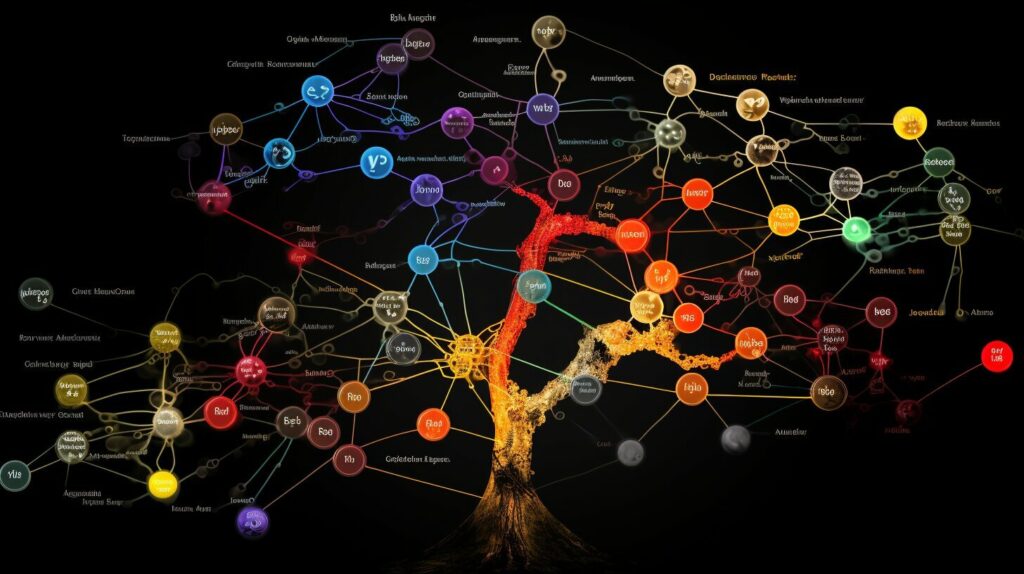
AI-Driven Innovation
AI technology is revolutionizing the corporate world, offering a wide range of benefits for companies. One of the key advantages of AI in business is its ability to fuel innovation. By providing insights into customer behavior, market trends, and data analysis, AI enables companies to develop new, high-value products and services tailored to customer preferences.
Through AI-driven innovation, businesses can stay ahead of the competition and meet the evolving needs of their target audience. AI algorithms analyze vast amounts of data, uncovering valuable patterns, and generating innovative ideas. This data-driven approach helps companies identify untapped market opportunities and create cutting-edge solutions that resonate with customers.
However, embracing AI-driven innovation can present challenges. Expert staffing needs and bias within AI models are among the potential hurdles that companies may face. It is important for organizations to address these challenges through proper training and robust quality assurance processes, ensuring that AI-driven innovations are ethically and efficiently implemented.
“AI-driven innovation allows businesses to push the boundaries of what is possible, opening up new horizons for growth and success. By harnessing the power of AI technologies, companies can unlock valuable insights, identify emerging trends, and create disruptive products and services that drive business growth.”
In summary, AI-driven innovation holds immense potential for companies. By leveraging AI technologies and data-driven insights, businesses can break new ground, develop innovative solutions, and solidify their position in the market. While challenges exist, the benefits of AI in the corporate world outweigh the obstacles, paving the way for a future of continual innovation and growth.

Addressing AI Talent Challenges
Leveraging AI in business operations can greatly benefit companies, but one of the biggest challenges they face is finding qualified AI talent. The demand for professionals with expertise in AI continues to grow, and the supply is struggling to keep up. However, there are strategies that businesses can adopt to address these talent challenges and ensure successful AI implementation.
Retraining existing staff is a practical solution that can help organizations overcome the shortage of AI talent. By providing training and upskilling opportunities, companies can equip their current employees with the knowledge and skills necessary to work with AI technologies. This approach not only helps bridge the talent gap but also boosts employee engagement and retention.
Collaborating with data scientists is another effective way to address AI talent challenges. Data scientists bring a wealth of expertise in working with data and AI models. Partnering with them allows organizations to leverage their knowledge and insights to evaluate and understand data, leading to improved AI implementation and impactful business outcomes.
By retraining existing staff and collaborating with data scientists, companies can address the AI talent challenges they face. This approach enables organizations to stay competitive, reduce costs, and harness the full potential of AI in their business operations.

Table: Strategies for Addressing AI Talent Challenges
| Strategy | Description |
|---|---|
| Retraining Existing Staff | Provide training and upskilling opportunities to current employees to equip them with AI knowledge and skills. |
| Collaborating with Data Scientists | Partner with data scientists to leverage their expertise in data analysis and AI models for improved AI implementation. |
| Exploring AI Talent Pool | Investigate AI talent pools through recruitment agencies, online platforms, and industry networks. |
By adopting these strategies, businesses can overcome the challenges of finding qualified AI talent and pave the way for successful AI integration in their operations. With the right people in place, organizations can fully leverage the benefits of AI and drive innovation, efficiency, and growth.
AI Generated Business Strategies
In today’s rapidly evolving business landscape, leveraging AI in business operations has become essential for companies seeking to stay ahead of the competition. One area where AI proves particularly valuable is in generating data-driven business strategies. By utilizing sophisticated tools and algorithms, AI can provide valuable insights that help executives make informed decisions and drive success within their organizations.
AI-generated strategies offer several benefits for companies. First and foremost, they are unbiased and based on large datasets, ensuring that decisions are not influenced by personal biases or limited information. This allows companies to have a holistic view of the market and industry trends, empowering them to make well-informed strategic choices.
Moreover, AI-generated strategies can uncover patterns and correlations within data that may not be immediately evident to human analysts. This enables businesses to identify new growth opportunities, optimize their operations, and develop innovative approaches to address market challenges.
By harnessing the power of AI to generate business strategies, companies can position themselves for long-term success. With the ability to access vast amounts of data and generate actionable insights, AI empowers executives to make data-driven decisions that drive growth and maximize their competitive advantage.
| Benefits of AI Generated Business Strategies | Explanation |
|---|---|
| Unbiased decision-making | AI eliminates personal biases and ensures objective decision-making based on extensive data analysis. |
| Identification of new growth opportunities | AI can uncover hidden patterns and correlations within data, revealing new avenues for growth and innovation. |
| Optimization of operations | By analyzing vast amounts of data, AI-generated strategies can help businesses optimize their processes and enhance efficiency. |
| Informed strategic choices | AI provides executives with comprehensive insights into market trends and industry dynamics, enabling them to make well-informed strategic decisions. |
Overall, leveraging AI to generate business strategies is a powerful tool that allows companies to unlock growth and drive success. By embracing the capabilities of AI, businesses can gain a competitive edge and navigate the complexities of the modern business landscape with confidence.

Implementing AI Technologies in Business Functions
In today’s fast-paced business landscape, leveraging AI technologies has become essential for organizations looking to stay ahead. By integrating AI into various business functions, companies can unlock a multitude of benefits, ranging from improved efficiency to enhanced customer experiences and long-term growth.
Leveraging AI in Customer Experience Enhancement
One area where AI can make a significant impact is in customer experience enhancement. By analyzing customer data and preferences, AI-powered systems can personalize interactions and provide tailored recommendations. This not only improves customer satisfaction but also increases engagement and builds brand loyalty.
Additionally, AI technologies can automate routine customer service tasks, such as answering frequently asked questions or handling basic inquiries. This frees up human resources to focus on more complex and value-added activities, further enhancing the overall customer experience.
Driving Process Automation with AI
Implementing AI technologies in business operations can lead to significant automation benefits. AI-powered systems can streamline repetitive tasks, such as data entry, report generation, and inventory management. This not only improves efficiency but also reduces human error and frees up valuable employee time.
Furthermore, AI algorithms can analyze large datasets and identify patterns or anomalies, enabling organizations to make data-driven decisions and optimize processes. This data-driven approach not only improves accuracy but also enhances productivity and drives operational excellence.
Using AI for Data Analytics and Insights
AI technologies play a crucial role in data analytics and extracting meaningful insights. By analyzing vast amounts of data in real-time, AI algorithms can identify trends, predict outcomes, and provide actionable recommendations. This enables organizations to make informed decisions, identify new business opportunities, and stay one step ahead of the competition.
Moreover, AI-powered data analytics can help businesses identify potential risks, fraud, or security breaches, allowing for proactive measures to be taken. This ensures business continuity and safeguards sensitive information, further adding to the overall benefits of implementing AI technologies in business functions.
| Benefits of AI in Business Functions |
|---|
| Improved efficiency and productivity |
| Enhanced customer experiences and personalization |
| Streamlined process automation |
| Data-driven decision making and insights |
| Increased accuracy and reduced human error |
In conclusion, incorporating AI technologies into various business functions offers numerous advantages for organizations. From customer experience enhancement to process automation and data analytics, AI can drive efficiency, improve decision-making, and ultimately contribute to long-term business success. By embracing AI and harnessing its potential, companies can stay competitive in a rapidly evolving digital landscape.
Maximizing Business Benefits with Generative AI Integration
Generative AI integration is revolutionizing the way businesses operate, offering a wide range of benefits that can significantly impact success and growth. By harnessing the power of generative AI, businesses can save time, reduce costs, personalize experiences, automate routine tasks, analyze data more effectively, and provide improved customer experiences.
One of the key advantages of generative AI integration is its ability to automate content production. With generative AI, businesses can create high-quality content quickly and efficiently, freeing up valuable time and resources for other essential tasks. Whether it’s generating product descriptions, blog posts, or social media content, generative AI ensures consistency, accuracy, and customization to suit specific business needs.
Furthermore, generative AI integration helps businesses achieve cost reductions by automating repetitive and time-consuming tasks. By automating routine processes, companies can increase efficiency and allocate resources to more strategic initiatives. This not only streamlines operations but also improves productivity, enabling businesses to focus on core competencies and drive growth.
| Benefits of Generative AI Integration in Business |
|---|
| Automated content production |
| Time and cost savings through task automation |
| Personalization and customization |
| Improved data analysis capabilities |
| Enhanced customer experiences |
Generative AI integration also enables businesses to personalize experiences and cater to individual customer preferences. By leveraging data-driven insights, generative AI can deliver personalized recommendations, tailored marketing campaigns, and customized product offerings. This level of personalization not only enhances customer satisfaction but also increases customer loyalty and drives repeat business.
Moreover, generative AI integration empowers businesses to analyze data more effectively. By leveraging advanced algorithms, generative AI can identify patterns, trends, and correlations in large datasets. This enables businesses to make data-informed decisions, improve strategic planning, and identify new opportunities for growth and innovation.
“Generative AI integration offers businesses a multitude of benefits, from automated content production and cost savings to personalized experiences and enhanced data analysis capabilities. By harnessing the power of generative AI, businesses can maximize their potential for success and stay ahead in today’s competitive business landscape.”
Businesses that embrace generative AI integration can ultimately provide improved customer experiences. From chatbots that offer instant and accurate responses to virtual personal assistants that streamline customer interactions, generative AI enhances the overall customer journey. By delivering timely and personalized experiences, businesses can foster stronger connections with their customers and drive long-term loyalty.
Summary
Generative AI integration offers numerous benefits for businesses, including automated content production, time and cost savings, personalization, improved data analysis capabilities, and enhanced customer experiences. By leveraging generative AI, businesses can streamline operations, increase efficiency, and unlock new growth opportunities. As technology continues to evolve, generative AI integration will become increasingly crucial in gaining a competitive edge and driving success in the business landscape.

Conclusion
AI technologies offer numerous benefits for businesses, revolutionizing the way they operate and thrive in the competitive landscape. By embracing AI and leveraging its capabilities, companies can unlock growth, drive success, and stay ahead in today’s fast-paced business world.
One of the key advantages of AI in business is the improved decision-making process. AI algorithms analyze vast amounts of data and generate valuable insights, enabling organizations to make informed choices and optimize outcomes. From automated customer segmentation to personalized product recommendations, AI empowers companies to deliver efficient and effective marketing campaigns, ultimately driving business success.
Furthermore, AI fosters innovation by providing deep insights into customer behavior and market trends. This enables companies to develop new and high-value products or services that cater to customer preferences. Although there may be challenges in embracing AI-driven innovation, such as expert staffing needs and bias within AI models, the potential for business growth far outweighs the obstacles.
By incorporating AI technologies into various business functions, such as customer experience enhancement and process automation, organizations can achieve enhanced efficiency, cost savings, and improved customer satisfaction. AI’s ability to analyze data, automate routine tasks, and personalize experiences ensures long-term success and boosts customer loyalty.
FAQ
What are the benefits of AI in business?
AI in business offers numerous advantages, including improved decision-making, enhanced efficiency, cost savings, innovation, and personalized customer experiences.
How does AI help in generating business insights?
AI can analyze extensive data, identify patterns, and generate valuable insights for businesses. It enables data-driven decision-making and supports informed strategies and planning.
How can AI enhance a company’s competitive advantage?
By leveraging AI, companies can analyze supply chains, develop targeted marketing strategies, improve pricing models, strengthen analytics capabilities, and build strong partner networks, leading to increased competitiveness and overall success.
In what ways does AI benefit decision-making processes?
AI analyzes data, generates insights, and supports automated customer segmentation, personalized product recommendations, fraud detection, and effective marketing campaigns. This leads to more efficient decision-making and better outcomes.
How does AI drive innovation in the corporate world?
AI provides insights into customer behavior, market trends, and data analysis, enabling companies to develop new, high-value products or services tailored to customer preferences. AI-driven innovation fuels business growth and success.
How can businesses address AI talent challenges?
Organizations can overcome AI talent challenges by retraining existing staff and collaborating with data scientists. Retraining helps companies stay competitive, reduce costs, and increase employee engagement, while collaboration with data scientists provides unique insights and expertise.
How can AI generate effective business strategies?
AI utilizes tools and algorithms to generate data-driven insights, allowing executives to make informed decisions and drive success within their organizations. AI-generated strategies are unbiased and based on extensive datasets.
In which business functions can AI technologies be implemented?
AI technologies can be implemented in various business functions, such as customer experience enhancement, process automation, supply chain management, marketing, and pricing models, leading to increased efficiency and cost savings.
How can businesses maximize the benefits of Generative AI integration?
Integrating Generative AI with existing applications can automate content production, reduce costs, save time, personalize experiences, automate routine tasks, analyze data, and improve customer experiences, maximizing its benefits for business growth.
What are the overall benefits of AI in business?
AI technologies provide significant benefits for businesses, ranging from improved decision-making and efficiency to enhanced customer experiences and innovation. By embracing AI and leveraging its capabilities, organizations can unlock growth, drive success, and stay ahead in today’s competitive business landscape.
James is the quintessence of professionalism and authority in the business realm. With years of experience navigating the complexities of the corporate world, he brings an unparalleled depth of knowledge and insight to our team. James’s analytical skills and business acumen allow him to dissect and present news stories with clarity and precision, offering our readers a comprehensive understanding of the latest business trends and economic shifts.
AI in Business
Explore Top AI Jobs – Exciting Opportunities Awaiting You!

The artificial intelligence industry is witnessing swift expansion, offering numerous job opportunities for individuals looking to embark on a rewarding path within the sphere of artificial intelligence. From artificial intelligence jobs to AI careers, the employment landscape is brimming with possibilities. For those who are enthusiastic about cutting-edge technology and aspire to make a meaningful impact, exploring AI jobs should be at the top of their list.
Artificial intelligence jobs span across various industries, including healthcare, energy, banking, retail, and more. The demand for AI professionals is soaring as organizations recognize the transformative potential of AI. Whether it’s developing innovative AI algorithms or implementing AI solutions, there are countless avenues to explore in this rapidly growing field.
When searching for AI job opportunities, keep an eye out for job postings in the AI field. These vacancies offer a chance to join dynamic teams and work on groundbreaking projects that shape the future of technology. With the right skills and qualifications, the prospects for a successful AI career are incredibly promising.
Key Takeaways:
- AI offers exciting job opportunities in various industries.
- Stay updated on AI job postings to find the right opportunity for you.
- Develop the necessary skills and qualifications for AI careers.
- Join AI communities and participate in projects to enhance your AI skills.
- Building an online presence can help attract potential AI employers.
AI Jobs in Various Industries Beyond Big Tech
When we think of AI jobs, big tech companies like Google, Microsoft, and Amazon often come to mind. However, the demand for AI professionals extends far beyond the tech giants. Industries such as agriculture, banking, retail, energy, and pharmaceuticals are also embracing AI technologies and searching for talented individuals with AI expertise.
In the agriculture sector, AI is being used to optimize crop production, enhance irrigation systems, and improve pest management. This has led to the emergence of AI jobs in areas such as precision agriculture, crop modeling, and agricultural robotics.
Banks and financial institutions are leveraging AI to detect fraud, automate processes, and provide personalized financial recommendations to customers. As a result, there is a growing demand for AI professionals in areas such as algorithmic trading, credit risk analysis, and customer experience optimization.
Retail companies are utilizing AI to enhance customer experiences, streamline supply chain operations, and improve inventory management. This has created job opportunities in areas such as demand forecasting, personalized marketing, and inventory optimization.
In the energy sector, AI is being applied to optimize power generation, improve energy efficiency, and enable predictive maintenance of infrastructure. This has led to the need for AI professionals in areas such as smart grid management, energy forecasting, and renewable energy optimization.
Pharmaceutical companies are utilizing AI to accelerate drug discovery, improve clinical trial efficiency, and enhance personalized medicine. As a result, there is a demand for AI professionals in areas such as bioinformatics, drug repurposing, and clinical data analysis.
Overall, AI jobs are not limited to big tech companies; they are found in various industries where AI is driving innovation and solving complex problems. Whether you are interested in agriculture, banking, retail, energy, or pharmaceuticals, there are exciting AI career opportunities awaiting you beyond the realm of big tech.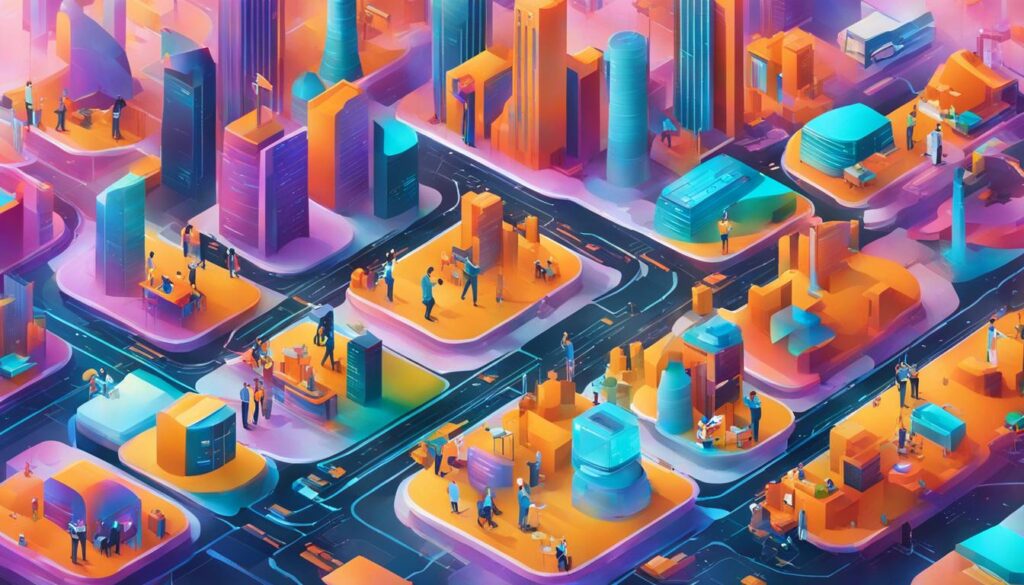
Table: AI Jobs in Various Industries
| Industry | AI Job Roles |
|---|---|
| Agriculture | Precision agriculture specialist Agricultural robotics engineer Crop modeling analyst |
| Banking | Algorithmic trading analyst Credit risk analyst Customer experience optimization specialist |
| Retail | Demand forecasting analyst Personalized marketing strategist Inventory optimization specialist |
| Energy | Smart grid management analyst Energy forecasting specialist Renewable energy optimization engineer |
| Pharmaceuticals | Bioinformatics scientist Drug repurposing specialist Clinical data analyst |
Key Skills for AI Jobs
When it comes to pursuing a career in artificial intelligence (AI), having the right skills is crucial. AI professionals need both technical expertise and soft skills to excel in their roles. Here are some key skills that are highly sought after in the AI job market:
Technical Skills:
- AI Programming Languages: Proficiency in programming languages like Python is essential for AI professionals. Other popular languages in the AI field include TensorFlow and PyTorch.
Soft Skills:
- Adaptability: As AI technology continues to evolve rapidly, being adaptable and open to learning new tools and techniques is crucial for success.
- Problem-solving: AI professionals should have strong problem-solving skills to analyze complex data, understand patterns, and develop innovative solutions.
- Communication: Effective communication skills are essential for AI professionals to convey complex ideas, collaborate with cross-functional teams, and present findings or insights.
- Teamwork: Collaboration is key in the AI field, as projects often require a multidisciplinary approach. AI professionals should be able to work well in teams and contribute effectively to achieve common goals.
Building an Online Presence:
Building an online presence is also important for AI professionals. Maintaining a strong presence on platforms like LinkedIn can help showcase your AI skills, connect with other professionals in the field, and attract potential employers. Additionally, joining AI communities and actively participating in AI projects can provide valuable networking opportunities and enhance career prospects.
By developing a combination of technical skills, soft skills, and building an online presence, AI professionals can position themselves for success in the competitive AI job market. Continuously updating your skills and staying informed about the latest advancements in the field can further boost your career prospects in the exciting world of artificial intelligence.

Job Roles in AI and Their Salary Ranges
When it comes to pursuing a career in artificial intelligence (AI), there are various job roles to consider, each with its own salary range. These roles span different areas of expertise and responsibilities, catering to the diverse needs of the AI industry.
Here are some of the prominent job roles in AI along with their estimated salary ranges:
| Job Role | Salary Range |
|---|---|
| AI Engineer | $90,000 – $150,000 per year |
| Machine Learning Engineer | $100,000 – $160,000 per year |
| Data Scientist | $95,000 – $150,000 per year |
| Natural Language Processing Engineer | $100,000 – $160,000 per year |
| Computer Vision Engineer | $95,000 – $150,000 per year |
| AI Ethicist | $80,000 – $130,000 per year |
| AI Researcher | $100,000 – $180,000 per year |
| Robotics Engineer | $90,000 – $150,000 per year |
| Machine Learning Operations Engineer | $100,000 – $160,000 per year |
| Automation Engineer | $90,000 – $150,000 per year |
| AI Consultant | $80,000 – $130,000 per year |
| AI Recruiter | $70,000 – $120,000 per year |
It’s important to note that these salary ranges are estimates and can vary depending on factors such as experience, qualifications, location, and the specific company or industry. Additionally, the salary ranges may be subject to change over time as the AI field continues to evolve and grow.
When considering a career in AI, it’s recommended to research and understand the average salary ranges for your desired job role in order to make informed decisions and negotiate fair compensation.
Top AI Companies Hiring in 2023
When it comes to AI job opportunities, several top companies are leading the way in innovation and are actively hiring in 2023. These companies offer exciting career prospects and the chance to work on cutting-edge AI technologies. Let’s take a closer look at some of the top AI companies hiring this year.
Reclaim.ai
“We are revolutionizing the way people manage their time and optimize productivity using AI-driven solutions.”– Reclaim.ai
Reclaim.ai is a company that focuses on time management and productivity solutions, leveraging AI technology. They are hiring talented individuals who are passionate about solving complex problems related to time optimization. Joining Reclaim.ai means being part of a team that is dedicated to helping individuals reclaim their time and achieve their goals.
OpenAI
“We are building safe and beneficial AGI (artificial general intelligence) to ensure that humanity thrives.”– OpenAI
OpenAI is on a mission to develop artificial general intelligence that benefits all of humanity. They are actively seeking individuals with a strong background in AI research and development to join their team. Working at OpenAI means contributing to the advancement of AI technology and being part of a community that is focused on creating a positive impact on the world.
Grammarly
“We empower people to communicate effectively, ensuring their writing is clear, mistake-free, and impactful.”– Grammarly
Grammarly is a company that offers AI-powered writing assistance to help individuals improve their communication skills. They are looking for talented individuals who are passionate about language and AI technology. Joining Grammarly means being part of a team that is dedicated to making writing clear, mistake-free, and impactful for people around the world.
Hive, Sanctuary, Lambda, Dataiku, Tessian
“We are actively expanding our teams and seeking individuals who are passionate about AI and its potential.”– Hive, Sanctuary, Lambda, Dataiku, Tessian
In addition to Reclaim.ai, OpenAI, and Grammarly, other top AI companies hiring in 2023 include Hive, Sanctuary, Lambda, Dataiku, and Tessian. Each of these companies offers unique AI-related services and products, and they are seeking talented individuals to join their teams. Working at these companies means being at the forefront of AI innovation and making a meaningful impact in the field.
These top AI companies are creating exciting opportunities for professionals looking to work in the AI industry. Whether you’re interested in time optimization, AGI development, writing assistance, or other AI-related fields, these companies offer diverse career paths and the chance to work with cutting-edge technologies. Make sure to explore these opportunities and take the first step towards building a successful career in artificial intelligence.
Career Opportunities in Artificial Intelligence
Artificial Intelligence (AI) offers an array of exciting career opportunities, with each path presenting its own unique challenges and rewards. As the demand for AI professionals continues to grow, there are several key roles that are highly sought after in the industry.
Big Data Engineer
A big data engineer specializes in managing and analyzing large sets of data to extract meaningful insights. They utilize advanced tools and technologies to collect, store, and process data, ensuring its accuracy and security. With the rapid growth of data-driven industries, such as finance and healthcare, the demand for big data engineers is on the rise.
Business Intelligence Developer
A business intelligence developer plays a crucial role in transforming raw data into actionable business insights. They design and develop applications and systems that enable companies to gather, analyze, and interpret data for strategic decision-making. Business intelligence developers are in high demand across industries, helping organizations gain a competitive edge through data-driven strategies.
Data Scientist
Data scientists are experts in extracting valuable insights from complex and large datasets. They utilize statistical techniques and machine learning algorithms to identify patterns, trends, and correlations within data. Data scientists play a pivotal role in industries like finance, healthcare, and e-commerce, helping organizations make data-driven decisions and drive innovation.
Machine Learning Engineer
Machine learning engineers develop and deploy algorithms and models that allow computer systems to learn and make predictions or decisions without explicit programming. They work closely with data scientists to design and implement machine learning solutions that can be integrated into various applications, from recommendation engines to autonomous vehicles.
Research Scientist
Research scientists are at the forefront of AI innovation, conducting groundbreaking research and developing new algorithms and methodologies. They explore emerging technologies, experiment with new approaches, and push the boundaries of what AI can achieve. Research scientists typically hold advanced degrees and work in academia, research institutions, or technology companies.
Embrace the growing field of AI and explore the diverse career opportunities it offers. Whether you’re passionate about working with big data, transforming businesses through data-driven insights, or pushing the boundaries of AI research, there is a path that suits your interests and skills. Take the leap into the world of AI and make your mark in this exciting and ever-evolving field.
Skills and Education Required for AI Careers
When it comes to pursuing a career in AI, having the right skills and education is essential. AI professionals need a combination of technical expertise and relevant academic qualifications to thrive in this rapidly evolving field.
Programming Languages for AI
Proficiency in programming languages is a fundamental requirement for AI professionals. Some key programming languages for AI include Python, R, Scala, and Java. Python, in particular, is widely used in AI development due to its simplicity and extensive libraries for machine learning and data analysis. Additionally, knowledge of SQL (Structured Query Language) and Apache Spark can be beneficial for processing large datasets and performing complex analytics tasks in AI applications.
AI Education
While a bachelor’s degree in a related field can open doors to AI job opportunities, advanced degrees such as a master’s or PhD in AI can provide a competitive edge. Pursuing a master’s degree in AI deepens one’s understanding of advanced AI algorithms, machine learning techniques, and AI ethics. A PhD in AI offers the opportunity to conduct cutting-edge research in specialized areas of AI and contribute to the advancement of the field.
Graduate programs in AI typically cover topics such as machine learning, natural language processing, computer vision, robotics, and AI ethics. These programs often include hands-on projects and research opportunities, allowing students to apply their theoretical knowledge in practical settings. It’s worth noting that AI education is not limited to formal degree programs; there are also online courses and certifications available for professionals looking to upskill or transition into the AI field.
By acquiring the necessary skills and education, individuals can position themselves for success in AI careers. The demand for AI professionals continues to grow, and with the right qualifications and expertise, you can be at the forefront of this exciting and transformative field.
The Future of AI Careers
As we look ahead, the future of AI careers is incredibly promising. With the continuous advancements in AI technology, the demand for skilled professionals in this field is expected to grow exponentially. Companies across various industries are recognizing the potential of AI and are actively seeking individuals with AI expertise to drive innovation and solve complex problems.
The growth of AI job opportunities is not limited to traditional tech giants. In fact, AI is being adopted by industries ranging from agriculture to retail, energy to pharmaceuticals. This widespread adoption opens the door to a wide range of career opportunities in diverse sectors.
To thrive in the future of AI careers, it is important to develop and hone the skills that are in high demand. Technical skills, such as programming languages like Python and knowledge of tools like TensorFlow and PyTorch, are essential. Soft skills, such as adaptability, problem-solving, communication, and teamwork, are equally important in the rapidly evolving AI landscape.
“The future belongs to those who embrace the possibilities of AI and continuously learn and adapt to new advancements in the field.” – AI industry expert
As AI continues to advance, new job roles will emerge, and existing roles will evolve. For example, the rise of AI ethics has led to the emergence of AI ethicists who ensure responsible and ethical AI development and deployment. Machine learning operations engineers, automation engineers, and AI consultants are also becoming increasingly important in driving AI initiatives forward.
| AI Job Growth | AI Advancements | AI Skills in Demand |
|---|---|---|
| AI job opportunities are projected to grow at a rapid pace, offering abundant career prospects. | AI technology will continue to evolve, opening new possibilities and applications across industries. | Proficiency in programming languages like Python, TensorFlow, and PyTorch, as well as soft skills like adaptability and problem-solving, will be highly sought after. |
| AI job roles will become more specialized, with the emergence of roles like AI ethicists and machine learning operations engineers. | AI advancements will drive innovation in areas such as natural language processing, computer vision, and robotics. | Knowledge of AI tools, frameworks, and algorithms, coupled with expertise in specific domains, will be highly valuable. |
The future of AI careers is filled with exciting possibilities. By staying updated on the latest advancements, continuously enhancing our skills, and embracing the potential of AI, we can position ourselves for a rewarding and impactful career in this rapidly evolving field.
Conclusion
In conclusion, the field of artificial intelligence (AI) offers a world of exciting job opportunities and career growth potential. Whether you are interested in big data engineering, research scientist roles, or any other AI career path, there are diverse paths to explore and abundant possibilities to pursue.
By acquiring the necessary skills, education, and experience, you can embark on a fulfilling AI career and be a part of the ongoing AI revolution. With the increasing demand for AI professionals, now is the perfect time to start your AI job search and take advantage of the exciting opportunities that await you in the field of artificial intelligence.
At [Insert Company Name], we understand the importance of AI in today’s world, and we are committed to helping individuals like you navigate the AI job market. Our team of experts is here to support you throughout your AI career journey, providing guidance, resources, and connections to top AI companies. Together, let’s embrace the future of AI and build a successful and rewarding career in this rapidly evolving field.
FAQ
What are some popular AI job roles?
Some popular AI job roles include AI engineer or developer, machine learning engineer, data scientist, natural language processing engineer, computer vision engineer, AI ethicist, AI researcher, robotics engineer, machine learning operations engineer, automation engineer, AI consultant, and AI recruiter.
What industries offer AI job opportunities?
AI jobs can be found in various industries such as agriculture, banking, retail, energy, and pharmaceuticals.
What programming languages are important for AI jobs?
Proficiency in programming languages like Python, TensorFlow, and PyTorch is highly sought after for AI jobs.
What skills are important for AI professionals?
AI professionals should possess technical skills such as programming and proficiency in AI tools, as well as soft skills such as adaptability, problem-solving, communication, and teamwork.
Which top AI companies are hiring in 2023?
Some top AI companies that are actively hiring in 2023 include Reclaim.ai, OpenAI, Grammarly, Hive, Sanctuary, Lambda, Dataiku, and Tessian.
What are some AI career opportunities?
Some promising AI career paths include becoming a big data engineer, business intelligence developer, data scientist, machine learning engineer, and research scientist.
What skills and education are required for AI careers?
Technical skills in programming languages like Python, R, Scala, and Java, as well as knowledge of tools like SQL and Apache Spark, are important for AI careers. While a bachelor’s degree in a related field can open doors to AI job opportunities, advanced degrees such as a master’s or PhD in AI can provide a competitive edge.
What is the future of AI careers?
The future of AI careers looks promising, with continued job growth and advancements in the field. AI skills will remain in high demand as industries across sectors continue to adopt AI solutions and seek professionals with AI expertise.
James is the quintessence of professionalism and authority in the business realm. With years of experience navigating the complexities of the corporate world, he brings an unparalleled depth of knowledge and insight to our team. James’s analytical skills and business acumen allow him to dissect and present news stories with clarity and precision, offering our readers a comprehensive understanding of the latest business trends and economic shifts.
-

 AI in Legal2 weeks ago
AI in Legal2 weeks agoRevolutionizing Justice: How AI is Transforming the Legal Landscape
-

 AI Entertainment1 month ago
AI Entertainment1 month agoOpenAI Releases SORA: Breakthrough AI Platform
-
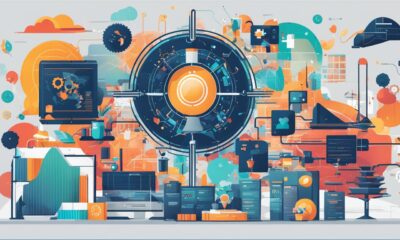
 AI in Business2 weeks ago
AI in Business2 weeks agoAI: The Powerhouse Driving Tomorrow’s Industries
-

 AI in Legal2 weeks ago
AI in Legal2 weeks agoFrom Briefs to Bytes: The Impact of AI on Legal Documentation
-

 AI in Business2 weeks ago
AI in Business2 weeks agoSecure Your Future with AI Data Privacy Assurance
-

 AI in Medicine2 weeks ago
AI in Medicine2 weeks agoRevolutionizing the Future: AI in Healthcare and Medicine
-

 AI Security2 weeks ago
AI Security2 weeks agoUnlock the Power of Robust AI Security for Your Business
-

 AI in Business2 weeks ago
AI in Business2 weeks agoAI’s Effect on Employment: Trends & Insights














